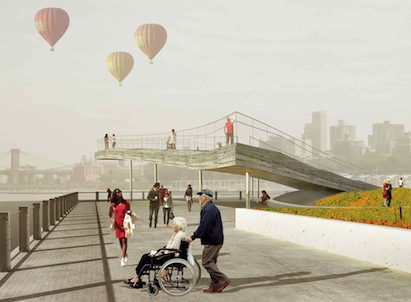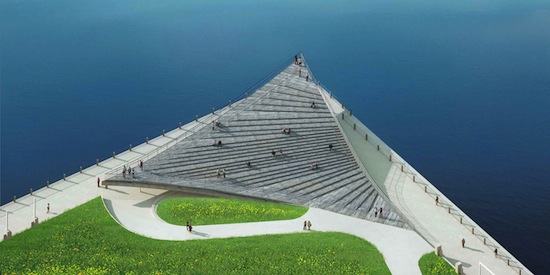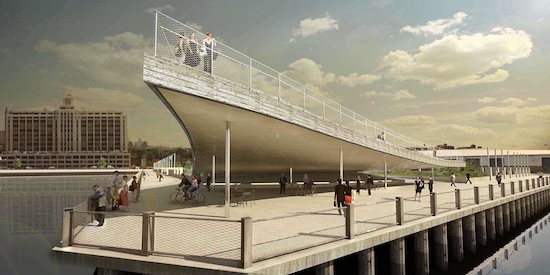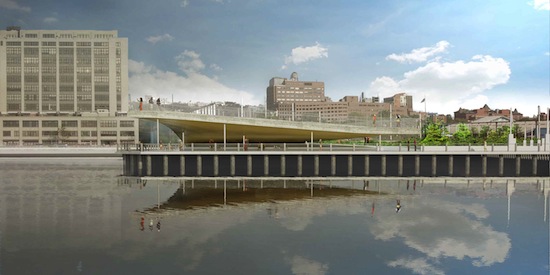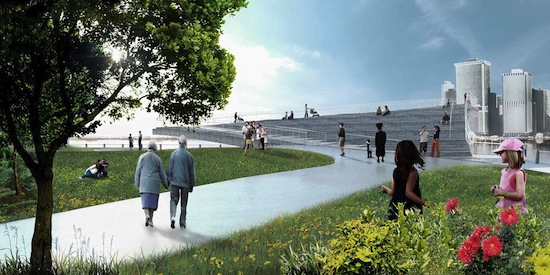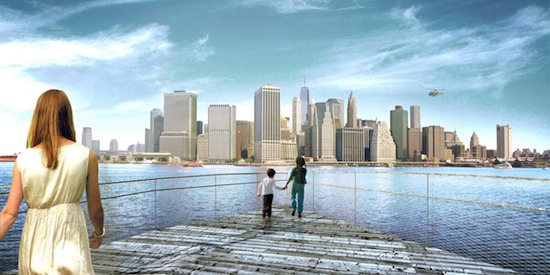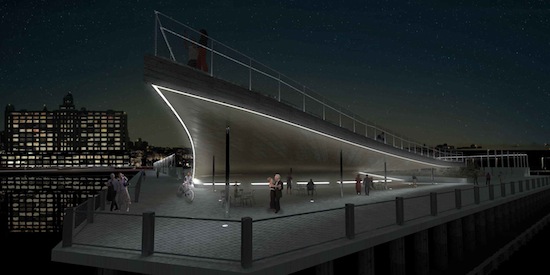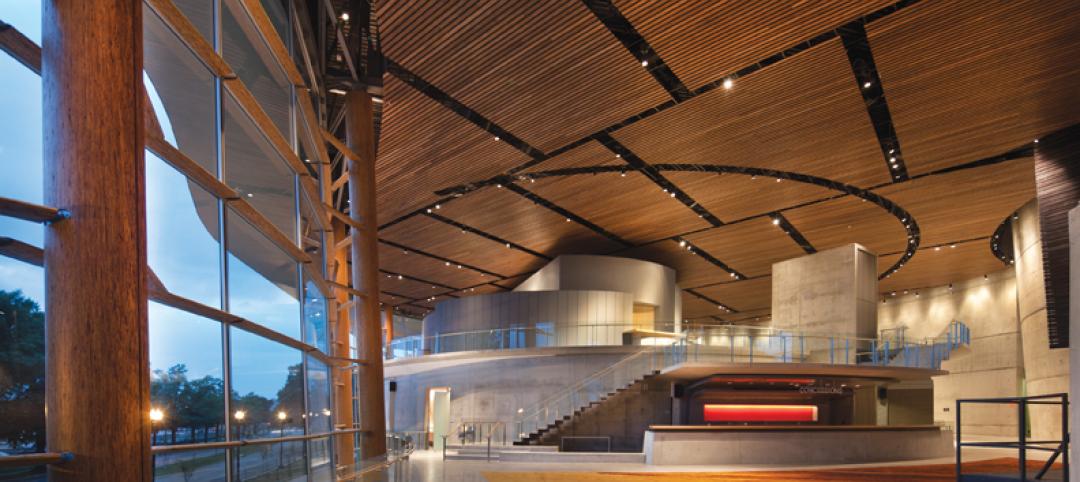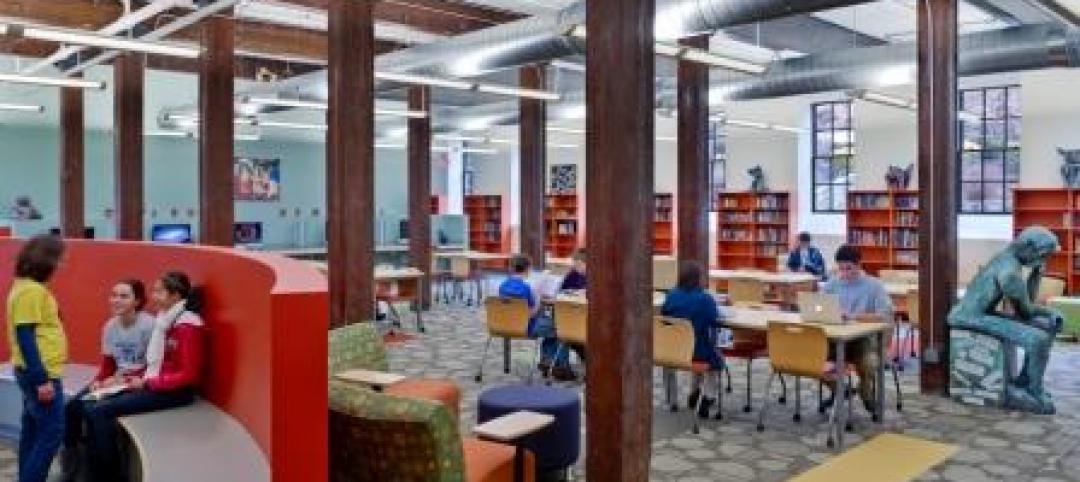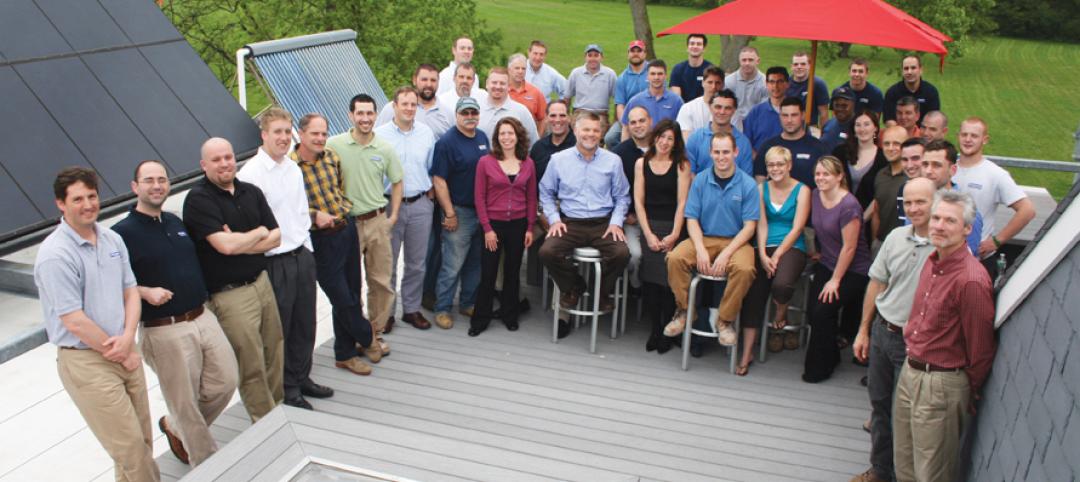BIG’s proposal for Brooklyn Bridge Park, a project that has revitalized the New York City waterfront, consists of a 6,000 ft2 (560 m2) triangular cross-laminated timber structure, serving both as pavilion and platform. Sloping upwards 17.5 feet (5.3 m) in height from the foot of the large gathering lawn, the platform provides magnificent views of the surrounding harbor, the Statue of Liberty, the Manhattan skyline, and the Brooklyn Bridge. In conjunction with the adjacent greenery, Pier 6 will be dominated by a flower field and treed areas giving the area seasonal displays of color.
The surface of terraced stairs, softly illuminated, will allow for large and small events and is fully ADA accessible. The pavilion, supported by thin steel columns, is brightly lit with up-lights and provides shade, shelter and space for indoor activities. Movable site furniture underneath the platform will accommodate a variety of programs, from food carts and picnicking to community events and small performances.
Bjarke Ingels comments: “The Mantaray is a small public platform at the end of the pier - equally accessible above and below. Its namesake organic slopes and curves have been shaped by concerns for accessibility, safety, shelter, structure - like a manmade reef evolved to accommodate human life.”
“This spectacular structure will provide much-needed shade and a unique space for public events, while offering a dramatic ascent to the water’s edge,” said Regina Myer, President of Brooklyn Bridge Park. “We are so pleased with the collaboration between Michael Van Valkenburgh’s landscape design for the southern portion of the park, and Bjarke Ingels’ design for a breathtaking architectural addition that provides a truly special moment on the waterfront.”
BIG was selected as winner of the project in Spring 2013. The collaboration between MVVA and BIG has evolved into a fruitful partnership where pavilion and landscape design inform and inspire each other. The project won the unanimous approval of the Community Board’s executive committee, as well as from the city’s Public Design Commission.
About Pier 6
Pier 6, located at the intersection of Furman Street and Atlantic Avenue, spans over 1.6 acres (6500 m2) and offers a diverse array of amenities, including sand volleyball courts, concessionaires, themed playgrounds, a dog run, plantings, and the seasonal Governor’s Island Ferry connecting Brooklyn and Governors Island.
About BIG
BIG – Bjarke Ingels Group is a leading international partnership of architects, designers, builders and thinkers operating within the fields of architecture, urbanism, research and development. BIG is led by partners – Bjarke Ingels, Andreas Klok Pedersen, Finn Nørkjær, David Zahle, Jakob Lange, Thomas Christoffersen and Managing Partners, Sheela Maini Søgaard and Kai-Uwe Bergmann – with offices in Copenhagen and New York. In all our actions we try to move the focus from the little details to the BIG picture. www.big.dk
About MVVA
MVVA- Michael van Valkenburgh Associates is a landscape architecture firm that creates environmentally sustainable and experientially rich places across a wide range of landscape scales, from city to campus to garden. With offices in Brooklyn, New York, and Cambridge, Massachusetts, and a staff of 65, MVVA approaches design and planning as a creative collective. www.mvvainc.com
COLLABORATORS
Michael Van Valkenburgh Associates (Landscape Design), Knippers Helbig (Structure), Tilotson Design Associates (Lighting Design), AltieriSeborWieber (MEP), Pantocraft (Code), Formactiv (Expediter)
Related Stories
| Feb 1, 2012
New ways to work with wood
New products like cross-laminated timber are spurring interest in wood as a structural material.
| Feb 1, 2012
Blackney Hayes designs school for students with learning differences
The 63,500 sf building allows AIM to consolidate its previous two locations under one roof, with room to expand in the future.
| Feb 1, 2012
Two new research buildings dedicated at the University of South Carolina
The two buildings add 208,000 square feet of collaborative research space to the campus.
| Feb 1, 2012
List of Top 10 States for LEED Green Buildings released?
USGBC releases list of top U.S. states for LEED-certified projects in 2011.
| Feb 1, 2012
ULI and Greenprint Foundation create ULI Greenprint Center for Building Performance
Member-to-member information exchange measures energy use, carbon footprint of commercial portfolios.
| Feb 1, 2012
AEC mergers and acquisitions up in 2011, expected to surge in 2012
Morrissey Goodale tracked 171 domestic M&A deals, representing a 12.5% increase over 2010 and a return to levels not seen since 2007.
| Jan 31, 2012
AIA CONTINUING EDUCATION: Reroofing primer, in-depth advice from the experts
Earn 1.0 AIA/CES learning units by studying this article and successfully completing the online exam.
| Jan 31, 2012
28th Annual Reconstruction Awards: Modern day reconstruction plays out
A savvy Building Team reconstructs a Boston landmark into a multiuse masterpiece for Suffolk University.
| Jan 31, 2012
Chapman Construction/Design: ‘Sustainability is part of everything we do’
Chapman Construction/Design builds a working culture around sustainability—for its clients, and for its employees.
| Jan 31, 2012
Fusion Facilities: 8 reasons to consolidate multiple functions under one roof
‘Fusing’ multiple functions into a single building can make it greater than the sum of its parts. The first in a series on the design and construction of university facilities.


